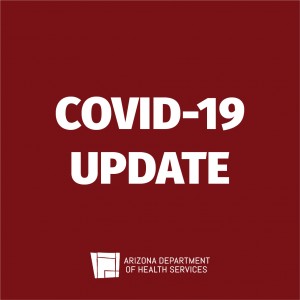 Over the next couple of days, Arizona will be adding a significantly higher number of cases than our recent average. This is a result of advancements in testing, and includes recently classified positive antigen cases dating back over the previous several months.
Over the next couple of days, Arizona will be adding a significantly higher number of cases than our recent average. This is a result of advancements in testing, and includes recently classified positive antigen cases dating back over the previous several months.
In late August, a fourth antigen test was authorized by the Food and Drug Administration (FDA) for diagnosing COVID-19. Antigen tests, not to be confused with serologic (or antibody) tests, can detect if a person is currently infected by looking for specific parts of the virus from a respiratory sample (like a nasal swab). This type of testing, used for viral infections like influenza or bacterial infections like strep throat, can play an important role in certain settings since they are point-of-care, meaning results may be available at the testing site in less than an hour. The University of Arizona is using antigen testing as part of their testing strategy as students and faculty have returned to campus. They’re not alone, with antigen testing receiving national recognition for its role in the return of Pac-12 football.
When compared to Polymerase Chain Reaction (PCR), antigen tests may not be as accurate or able to run as many patient samples per day. However, the quick results provide the ability to rapidly triage and make decisions.
Antigen testing for COVID-19 is becoming more readily available in Arizona. Until now, a person with a positive antigen test has only been counted in our Data Dashboard when they have a known exposure to a person with COVID-19 or have symptoms of COVID-19, such as shortness of breath, cough, or sore throat. However, some people with positive antigen tests have not been counted because they don’t know if they were in contact with a known COVID-19 case and they don’t have symptoms.
Moving forward, we are expanding how we define cases to include anyone with a positive antigen test in the probable case category, which is consistent with the recently updated national case definition for COVID-19 from the Council of State and Territorial Epidemiologists (CSTE). More information on the COVID-19 case definition for Arizona is available here. Our Data Dashboard has been updated to combine antigen and PCR tests into “COVID-19 Diagnostic Tests” to replace “COVID-19 PCR Tests.”
This week, we have been working on data validation and identifying antigen tests that meet the case definition. When our Data Dashboard updates today, 577 probable cases will be added. The majority of these are antigen positives collected in September, primarily from Pima County. Tomorrow, we will complete our validation and add the remaining positive antigen tests that have been reported to the Department over the previous several months. This change will provide a more accurate picture of COVID-19 in Arizona moving forward.
It’s important to note that classification of cases is a surveillance tool used to better understand the burden of disease in the community, but does not necessarily impact the way an individual is treated for a disease by their healthcare provider. The use and reporting of different tests continues to evolve as we increase our understanding of COVID-19.









